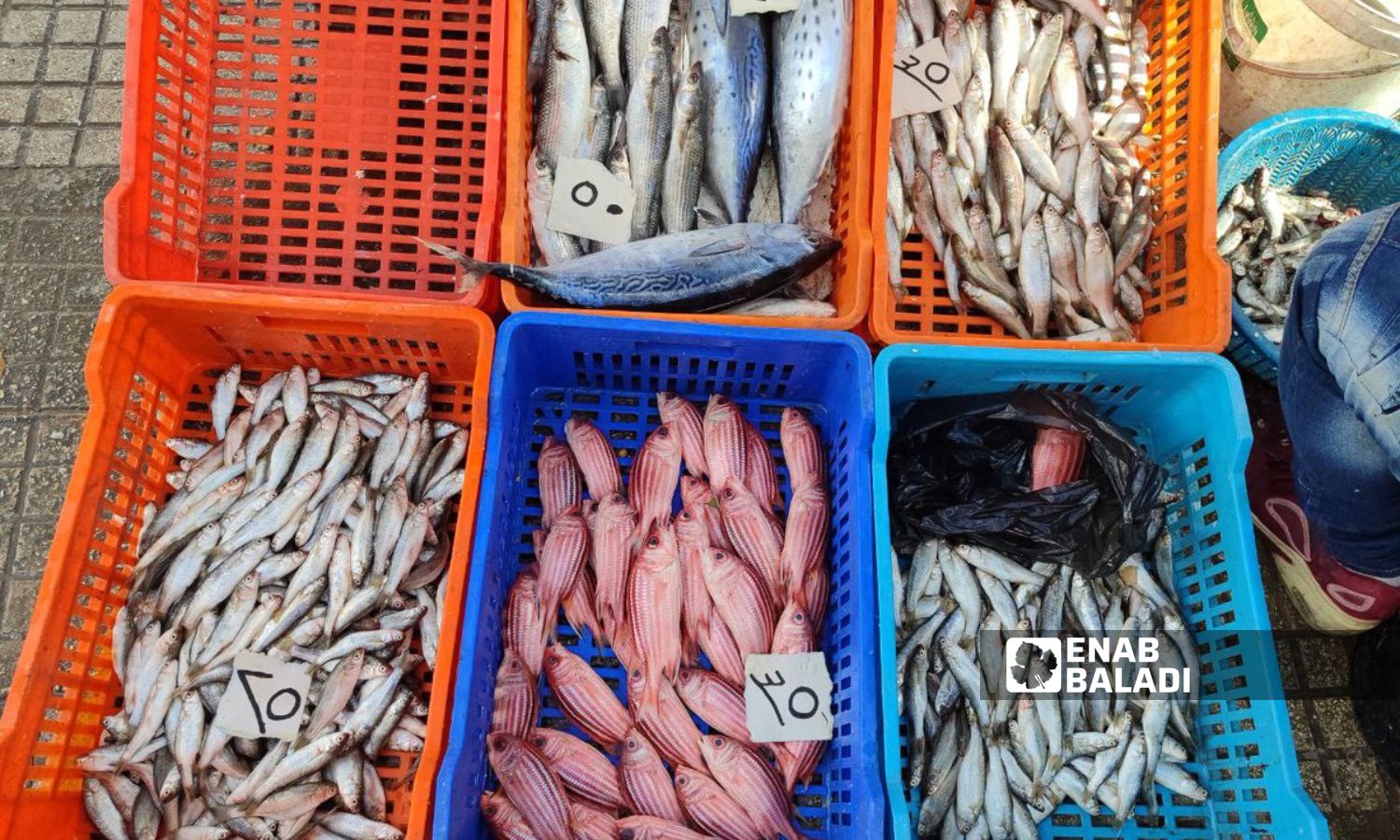



Latakia – Linda Ali
Near the branch of the Syrian Trading Establishment in the northern Raml neighborhood in the coastal Latakia governorate, the forty-year-old Mohammad tries to get an affordable price for two kilograms of sardines from the fish stall owner.
The vendor was insisting on a price of 25,000 Syrian pounds per kilogram, but Mohammad did not give up arguing. He continued to give back and forth and say that the size of the fish was small, so he succeeded in purchasing the two kilograms at a price of 45,000 pounds instead of 50,000 pounds.
Mohammad took his sardines and walked away, disappearing among the cars and passers-by on the famous popular neighborhood street in Latakia while the seller held his cigarette contaminated with fish remains, motioning to a young man nearby to put the money in the plastic bag.
The fish seller said that he goes on a fishing trip with his two sons every day and brings what the sea brings. He chose this corner because it is crowded. He determines his price based on the market price, so a kilo of porgy is 35,000 pounds, and a kilo of Synodontis schall is 50,000 pounds, deer fish 45,000, and bogue fish 35,000 pounds.
Some types are much more expensive, such as Qajjaj, the price of which reaches 120,000 pounds per kilogram, and al-Buraq (head bream Gilt), while Sultani fish exceeds 200,000 pounds per kilogram, noting that these types are not desirable in this popular street due to the inability of its users to purchase it, he added.
The fisherman sells high-priced species to large fisheries or restaurants or leaves some of them if one of his customers has recommended them to him on the phone. He makes sure to give his phone number to every customer and passerby who asks for it.
Those prices that the fisherman seller talked about were on the 23rd of last November, and they are not stable or fixed and change every day. On such days, fish prices begin to rise with the arrival of winter. For example, prices increased by about 25% in the third week of November compared to the second week of it.
During the past ten years, fish was not very popular in Latakia as a main dish on the tables of the majority of its people, who relied more on meat and chicken, but as a result of their high prices and the fact that fish remained affordable, they resorted to it as compensation for meat.
For example, Ibrahim, 38, a government employee who works another job in the afternoon, makes sure to buy fish three times a month, often the cheaper sardines or Palamida fish types, and sometimes he buys Asifari fish.
The prices of a kilogram of these types during the summer were between 18,000 and 22,000 pounds, and today they are between 25,000 and 50,000, and they remain cheaper than the price of chicken, as the price of one chicken reaches about 80,000 pounds, and it will not be enough for the family’s food unless another type is cooked alongside it. Meanwhile, two kilograms of fish at a price of approximately 50,000 is sufficient for lunch for his family of four people.
With the onset of winter and the onset of storms, the poor and those with limited income may not be able to obtain fish because prices continue to rise.
The minimum government salary is 186,000 pounds ($1=14,200 pounds).
Sulafa, 42, a government employee, waits in the afternoon or early evening to visit the fish market in Ugarit Square, as it is the place where the price of fish is considered the lowest compared to other areas such as Slaibeh or al-Azhari.
She said that by evening, the fishery owners want to get rid of their fish for fear that it will spoil, especially in the absence of the electricity needed to operate the refrigerator, so they want to get rid of it and sell it at any price.
But with the advent of winter, this plan no longer works very well, and many sellers resort to storing it in the refrigerator with some ice cubes, taking advantage of the cold weather.
The woman explained that she might not get the fish at the price she wanted, but it would certainly be less than the morning or afternoon hours, especially for the popular types that luxury restaurants do not buy, such as Mackerel and others.
The Shabatliya and Ras al-Basit tourist areas are considered among the most important sources of fish in the city, and many of their people work in marine fishing, but the obstacles placed in their way by the responsible authorities make them deprived of their livelihood.
Last June, the government newspaper Tishreen quoted fishermen in the city of Jableh saying that they had not obtained subsidized diesel for more than a month, and they were forced to buy it from the black market at high prices that made their trips losing trades.
At the time, the head of the Farmers’ Union in the governorate, Adeeb Mahfouz, responded to the complaint by saying that the Fishermen’s Association had not submitted any request to obtain diesel for the fishermen.
if you think the article contain wrong information or you have additional details Send Correction